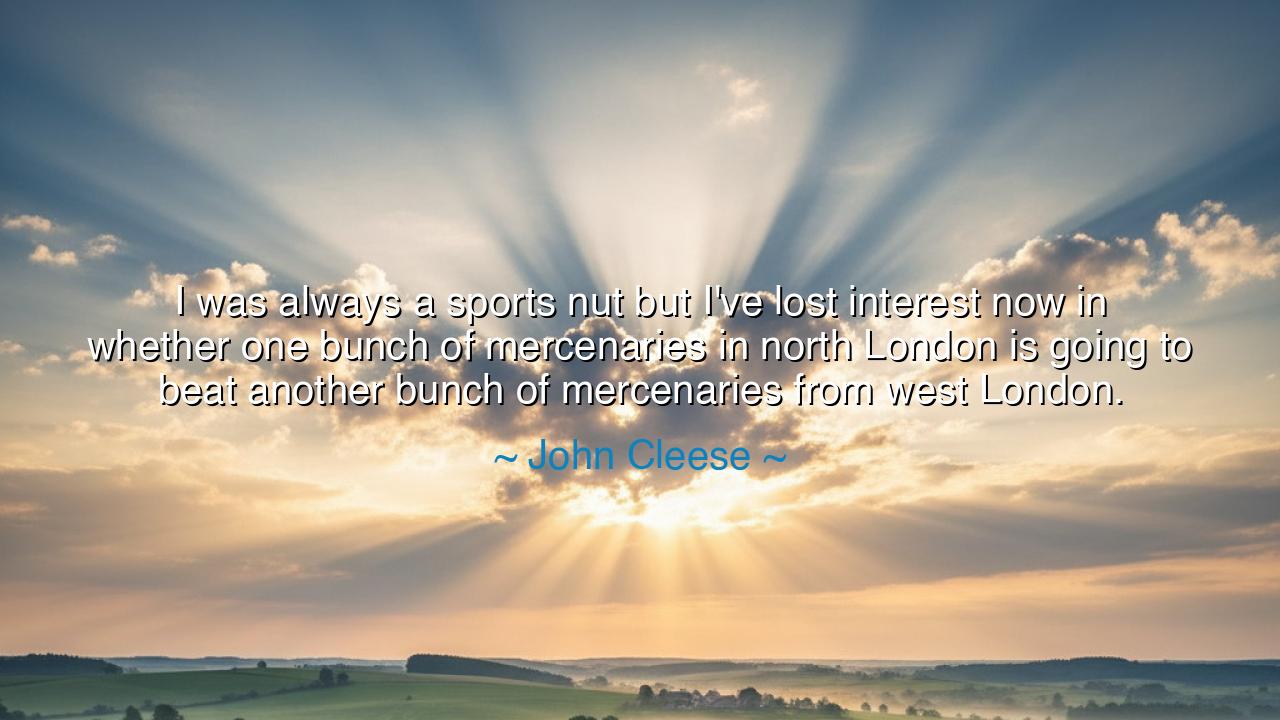
I was always a sports nut but I've lost interest now in whether
I was always a sports nut but I've lost interest now in whether one bunch of mercenaries in north London is going to beat another bunch of mercenaries from west London.






Hearken, O seekers of wisdom, and attend the words of John Cleese, who spoke with wit tempered by observation: “I was always a sports nut but I've lost interest now in whether one bunch of mercenaries in north London is going to beat another bunch of mercenaries from west London.” In these words lies both humor and reflection: a meditation on the transience of passion, the shifting of priorities, and the futility of attachment to contests that are, in essence, trivial when weighed against the greater pursuits of life.
The origin of this insight rests in Cleese’s journey from youthful fervor to mature discernment. Once consumed by the thrill of competition, the pulse of the stadium, and the drama of sport, he gradually saw that beneath the veneer of allegiance and spectacle lay little of lasting consequence. The teams he describes—the “mercenaries” of north and west London—are but instruments of performance, entertaining and impressive, yet ultimately impermanent and peripheral to the enduring matters of human life.
Consider the story of Marcus Aurelius, the philosopher-king of Rome, who once delighted in athletic training and contests in his youth. As he aged and embraced the duties of empire, he reflected upon these amusements with detachment, recognizing that the wars of the arena and the triumphs of physical skill, while spirited, offered little in the cultivation of virtue or wisdom. So too does Cleese acknowledge a similar realization: that the heart need not remain tethered to spectacles that stir the senses but leave the soul unmoved.
Yet there is also a subtle critique in his words. By calling the players “mercenaries,” Cleese highlights a truth about human endeavor: that competition is often motivated by reward, status, or spectacle rather than noble purpose. This mirrors history, where gladiators fought for the applause of crowds, knights jousted for glory, and men of renown contested in sports for recognition more than self-improvement. In recognizing the motives behind these battles, Cleese invites us to discern between substance and show, between meaningful endeavor and mere entertainment.
The ancients understood this well. The philosophers of Greece urged moderation and reflection upon the games; the stoics taught that attachment to ephemeral victories leads to disappointment, and that true fulfillment comes from cultivating virtue, wisdom, and self-mastery. Cleese’s words echo this lesson: one may appreciate the thrill of sport in youth, yet maturity brings the awareness that not all contests merit the heart’s investment, and that discernment is itself a form of wisdom.
From this reflection, a lesson emerges: pursue passions that enrich, challenge, and elevate the soul, and recognize when attachments are shallow or fleeting. Not all victories, nor the drama of rivalries, are worthy of devotion. Cleese’s detachment is not cynicism but clarity, a recognition that energy and attention are precious, and that they should be devoted to pursuits that leave lasting impact on self and society.
Practical action flows naturally: evaluate the endeavors you choose to invest in, and ask whether they cultivate skill, wisdom, or joy that endures. Do not abandon enjoyment lightly, but temper it with discernment, recognizing that spectacle often entertains without transforming. Engage fully where growth and meaning are present, and release attachment where it is superficial.
Thus, let the words of John Cleese endure: the contests of others, the ephemeral rivalries of north and west London, are fleeting. The heart grows wiser when it learns to distinguish between true worth and transient spectacle, embracing passion and effort where it matters, and reserving judgment and energy for pursuits that cultivate the soul, the mind, and the eternal character of a life well-lived.






AAdministratorAdministrator
Welcome, honored guests. Please leave a comment, we will respond soon